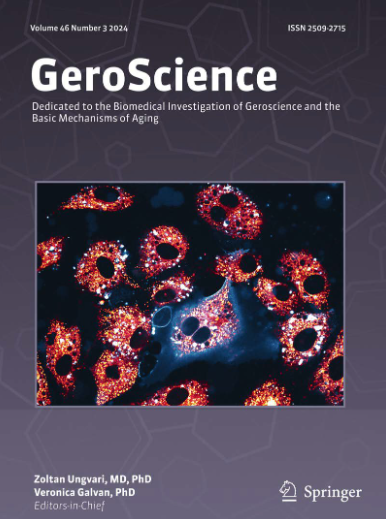Psychological predictors of gerascophobia among middle-aged and older adults: the role of health anxiety and body image satisfaction.
IF 5.3
2区 医学
Q1 GERIATRICS & GERONTOLOGY
引用次数: 0
Abstract
Gerascophobia-the excessive fear of aging-is linked to health anxiety and negative body perceptions. While health anxiety may heighten aging-related fears, body image satisfaction may buffer this effect. However, their interplay remains underexplored, particularly among community-dwelling middle-aged and older adults not receiving psychological care. This study aims to examine the predictive role of health anxiety on gerascophobia and assess whether body image satisfaction moderates this relationship among middle-aged and older adults. A cross-sectional analytical design was employed involving 539 community-dwelling adults aged 40-65 in Saudi Arabia. Participants completed validated Arabic versions of the Health Anxiety Inventory, Gerascophobia Scale, and Body Appreciation Scale-2 (BAS-2). Data were analyzed using correlation and regression analyses, including moderation testing with the PROCESS macro. Health anxiety positively predicted gerascophobia (B = 0.13, p < 0.001), while body image satisfaction was negatively associated (B = - 0.38, p < 0.001). A significant interaction effect (B = - 0.12, p < 0.001) indicated that the relationship between health anxiety and gerascophobia was strongest at low levels of body image satisfaction and non-significant at high levels. Body image satisfaction buffers the impact of health anxiety on gerascophobia, emphasizing its protective role. These findings suggest that mental health and nursing professionals should assess and address health anxiety and body image concerns to mitigate aging-related distress and promote emotional resilience in aging populations.中老年人老年恐惧症的心理预测因素:健康焦虑和身体形象满意度的作用
衰老恐惧症——对衰老的过度恐惧——与健康焦虑和对身体的负面看法有关。虽然健康焦虑可能会加剧与衰老有关的恐惧,但对身体形象的满意可能会缓冲这种影响。然而,它们之间的相互作用仍未得到充分探讨,特别是在没有接受心理治疗的社区居住的中老年人中。本研究旨在探讨健康焦虑对老年恐惧症的预测作用,并评估身体形象满意度是否在中老年人群中调节这种关系。采用横断面分析设计,涉及沙特阿拉伯539名40-65岁的社区居民。参与者完成了有效的阿拉伯文版本的健康焦虑量表、老年恐惧症量表和身体欣赏量表-2 (BAS-2)。使用相关和回归分析对数据进行分析,包括使用PROCESS宏进行适度测试。健康焦虑与老年恐惧症呈正相关(B = 0.13, p < 0.001),而身体形象满意度与老年恐惧症呈正相关(B = - 0.38, p < 0.001)。显著交互效应(B = - 0.12, p < 0.001)表明健康焦虑与老年恐惧症的关系在身体形象满意度低水平时最强,在身体形象满意度高水平时不显著。身体形象满意度缓冲健康焦虑对老年恐惧症的影响,强调其保护作用。这些发现表明,心理健康和护理专业人员应该评估和解决健康焦虑和身体形象问题,以减轻老龄化相关的痛苦,促进老年人的情绪恢复能力。
本文章由计算机程序翻译,如有差异,请以英文原文为准。
求助全文
约1分钟内获得全文
求助全文
来源期刊

GeroScience
Medicine-Complementary and Alternative Medicine
CiteScore
10.50
自引率
5.40%
发文量
182
期刊介绍:
GeroScience is a bi-monthly, international, peer-reviewed journal that publishes articles related to research in the biology of aging and research on biomedical applications that impact aging. The scope of articles to be considered include evolutionary biology, biophysics, genetics, genomics, proteomics, molecular biology, cell biology, biochemistry, endocrinology, immunology, physiology, pharmacology, neuroscience, and psychology.
 求助内容:
求助内容: 应助结果提醒方式:
应助结果提醒方式:


